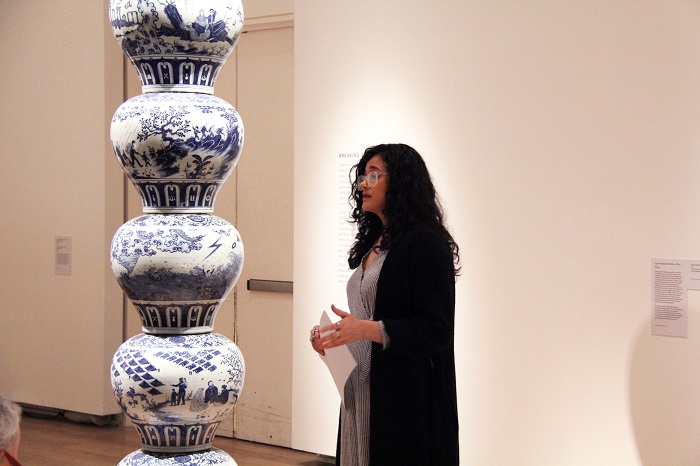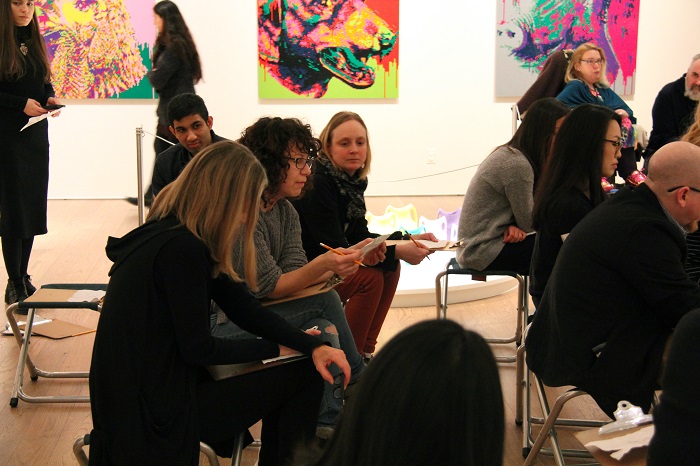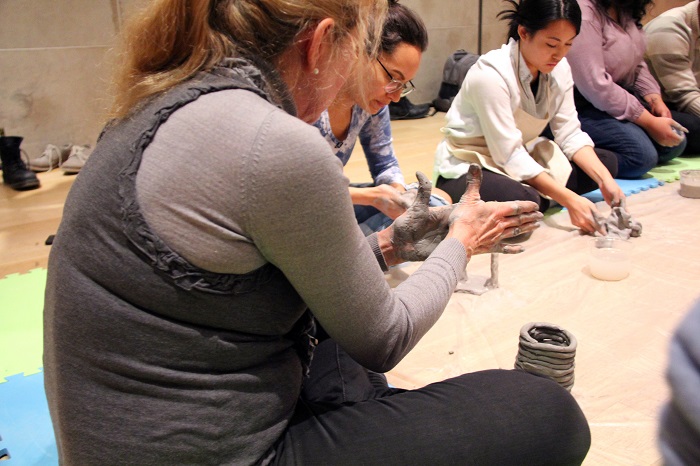Liberating narratives: A look back at the first AWW Free School workshop
By Bilqees Mohamed
On a Tuesday night, a group of strangers came together and unpacked their fears, joys, triumphs, and memories using words and clay during AWW Free School: Embodied Narratives, the first in a series of four interdisciplinary workshops inspired by the exhibition Ai Weiwei: Unbroken. Surrounded by works from the exhibition, facilitators Tara Farahani and Zahra Komeylian engaged visitors to reflect on how subjective and lived experiences can intersect with art and social change.
The night began with an in-gallery workshop led by Farahani, Artist-in-Residence at Ryerson’s Faculty of Community Services. After participants settled in next to Ai Weiwei’s towering installation Vases with Refugee Motif as a Pillar, Tara performed a powerful spoken word piece that drew from her Iranian-Canadian identity, unpacking the intergenerational trauma and disconnect she and her community have experienced as first and second generation immigrants.

This was the perfect segue into the main activity, titled “Layered Narratives,” which was intentional in challenging participants to consider what it means to hide behind a public facade, and to move from witnessing in everyday life to being witnessed. Participants anonymously wrote a couple of sentences that were guided by prompts, which varied from light-hearted questions such as “What was your favourite childhood toy and why?” to deeper questions like “What are you afraid to ask for?” The responses were then collected and redistributed, allowing participants to not only write responses to each other’s narratives, but also confront the fear of hearing their reflections read aloud.
Common threads surfaced, including reflections on society, unrequited love, politics, family relationships, and anxieties about the future. It was intriguing that many noted how similar their experiences were despite being complete strangers. The themes that emerged mirrored those evident in Ai’s Vases with Refugee Motif as a Pillar, as participants reflected on the ways in which structural power and surveillance work to suppress lived experiences and dissenting voices.

Perhaps social facades are responsible for preventing individuals from expressing themselves freely. Whether these facades are created to align with social expectations or used as a coping mechanism for social injustices, the reactions from the workshop made it apparent that vulnerability is not an option for many. The desire for human connection spoke to the heightened isolation and fear of vulnerability that people experience in the age of social media, where everything seems to revolve around tweeting, liking, and posting. This ultimately summarizes Farahani’s stance: that we must witness each other with compassion and empathy in order to allow ourselves to be witnessed by others.
The introspective atmosphere created by Farahani’s workshop set the tone for a contemplative clay work session led by Zahra Komeylian, a ceramic artist and educator who has written and presented on the intersection of contemplative clay work and embodiment from an anti-oppressive lens.

Participants were led to the Museum’s Terrace Room, where they sat cross-legged on colourful floor mats in a circle around mounds of clay. With soft music playing in the background, Komeylian opened the workshop with a guided mediation that focused on breathing and connecting with the body.
Komelyian then offered a prompt and instructed participants to silently work with the clay. Some created intricate designs, carving trees and roses from the clay, while others focused on using the clay as a tactile, therapeutic material. Following this, participants were invited to engage in a “witnessing,” where, if able to, they walked around and viewed each other’s artwork without judgement, noting any feelings that emerged from witnessing the many stories and narratives constructed in clay.

In a capitalist culture, where productivity and gratification are seemingly synonymous with one’s worth, prioritizing process over outcome can be cathartic. The workshop demonstrated to participants what patience and self-acceptance can embody, both physically and emotionally. This parallels Ai Weiwei’s ongoing critique of how value is determined through the destruction of historical artifacts, a theme that runs throughout his exhibition at the Gardiner.
The night concluded with Farahani and Komelyian joining forces to encourage participants, volunteers, and staff to capture how they felt as both events wrapped up. From curiosity to uncertainty and vulnerability to bravery, both workshops made it possible for participants to hone in on their lived experiences and use art as a way to find belonging, safety, and authenticity.
Inspired by the exhibition Ai Weiwei: Unbroken, AWW Free School is a unique workshop series presented in collaboration with Ryerson University that transforms the exhibition into a site for social action. Three upcoming workshops will focus on documentary media, performance, and online journalism, and are free to attend with registration. AWW Free School will culminate with AWW Free School Final: 6/4/89, a panel that reflects on the student protests at Tiananmen Square thirty years later.
Bilqees Mohamed is a third-year Social Work student at Ryerson University. She is currently pursuing a minor in Social Innovation, where she is exploring how dominant institutions incorporate anti-oppressive programming to engage marginalized communities. She is currently working with the Coalition of Alternatives to Streaming in Education (CASE) which advocates for an equitable and high-quality education for students impacted by academic streaming in Ontario. She considers herself an intersectional feminist and recently launched a media and social innovation hub for women and girls of colour called BadGal Media. She is currently the Program Assistant Intern at the Gardiner Museum, and is helping support the AWW Free School workshops.
AWW Free School Partners
![]()
![]()
![]()